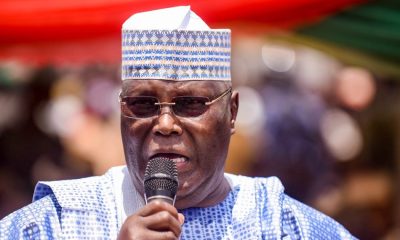NEWS
FG Says Only 55% of Nigerians Have Access to Electricity

By Tony Obiechina Abuja
The federal government says only 55 percent of Nigerians have access to electricity supply, with 86 percent based in the urban areas.
The Director General of National Council on Climate Change (NCCC), Dr.
Salisu Dahiru, made the disclosure at the opening of a two-day Africa Climate Forum 2023 in Abuja on Tuesday.According to him, the government was not determined to increase access to electricity for the populace and also working to transition from fossil energy to clean and renewable energy.
Dr Dahiru noted that the modeling of Nigeria’s draft Long-term Low Emission Development Strategy (LT-LEDS), indicates that about 60 percent of Nigeria’s electricity can be achieved under the gas economy scenario while 80 percent can be achieved under the renewable energy scenario by 2050, adding that this will progress to 92 percent in 2060 under the renewable energy scenario.
The two-day forum which was organised by the Global Centre for Law, Business and Economy (GCLBE), has as its theme, ‘Powering the Future: Financing Energy Transition for Sustainable Progress’.
Dr. Dahiru said that a decentralised renewable energy sector will create jobs in rural communities, noting that the sector employs twice as many workers directly and up to five times as many in indirect jobs, particularly in the informal economies, which are the largest source of employment for least developing countries.
He said, “According to the International Labour Organization (ILO) Green Job assessment, there will be about six million fossil fuel jobs lost, but with the right policies 24 million new jobs will be created by 2030.
“A key co-benefit from climate action will be the creation of green jobs. A study carried out during the revision of Nigeria’s Nationally Determined Contributions (NDC) in 2021 evaluating the impact of Nigeria’s climate policies on employment, GDP and emissions, found that in terms of total number of jobs created, policies to increase power generation have the largest effect.
“Over the period 2020 up to 2035, on average, around 12 million net additional jobs will be added across the economy as compared to a baseline scenario.”
He said in the quest for a better future, Africa must bridge technological gap and step up dialogue around innovation. “The energy sector is already leading the charge to zero emissions, with breakthroughs and rapid price declines across the auto, power and lighting sectors,” he added.
“Globally, the number of electric vehicles on the road has jumped from 17,000 in 2010 to more than 7.2 million today. The installation of solar power grew from 290 MW in 2001 to nearly 127,000 MW in 2020. The share of LED bulbs in the lighting market has grown from 1% in 2010 to an expected 69 percent in 2020 and will be nearly 100 percent by 2025”, he further stated.
Minister of State for Environment, Dr. Iziaq Kunle Salako, congratulated the organisers for taking the bold step to raise the issue of energy transition financing.
The minister, who was represented by Mrs. Eniobong Abiola Awe, promised that the federal government is fully committed to ensuring the attainment of net zero emission by 2060.
In his goodwill message, Chairman, Senate Committee on Climate Change, Senator Seriake Dickson, said that Nigeria’s dependence on fossil fuel is not only contributing to global warming, but also to air pollution, geopolitical and local conflicts as well as social inequities.
He said, “It is therefore our collective responsibility to drive this energy transition. Available records show that Africa has 40 percent of the world’s renewable energy sources, yet available financing so far indicate that we are only attracting two percent of funding.
“Achieving energy transition is not an easy task. It requires investment in innovative technology, massive in clean energy infrastructure and a shift generally in our energy consumption pattern.”
He promised that the National Assembly will be ready to support any move to achieve the financing of energy transition.
Director General of Global Centre for Law, Business and Economy, Dr. George Nwangwu, said that lack of reliable power poses a major constraint to both private citizens and businesses, resulting in annual economic losses estimated at $26.2 billion, an equivalent of 2 percent GDP.
“This is why it is crucial for Africa where most of the poor people in the world are resident to take issues around energy seriously,” he said.
The 2-day forum attracted participants and stakeholders from the energy sector as well as goodwill messages from the diplomatic community.
NEWS
Osun HoS, Aina Celebrates Adeleke’s Chief of Staff, Akinleye on Birthday Anniversary

From Ayinde Akintade, Osogbo
Osun State Head of Service, Elder ‘Leye Aina has rejoiced with the Chief of Staff to Governor Ademola Adeleke, Alhaji Kazeem Akinleye, on his birthday today
The Head of Service in his birthday’s congratulatory message to the Chief of Staff and made available to newsmen in Osogbo, the Osun State capital, noted that Alhaji Akinleye is not only a God – given gift to the incumbent administration of Governor Adeleke, he is a complete divine gift to his ancestral home of Edeland because of his laudable contributions.
“Alhaji Akinleye is one of the very few political giants and highly experienced politicians who started his political career from the position of a Ward Councillor and rose to become a Local Government Chairman before his appointment as the Chief of Staff.
“In the history of Osun State, Alhaji Akinleye can be described as the best Chief of Staff so far who is accessible, firm, humane, approachable and ever ready to defend the truth.
“The Chief of Staff’s remarkable qualities, including forthrightness, contentment, courage, genuine friendship and compassion, have made him a beloved figure among his admirers, colleagues and associates.
The Head of Service noted that his heartfelt message includes prayers for Alhaji Akinleye’s continued strength, joy and influence. He prayed that his star will never go dim.
“As I wish you Happy Birthday, long life and prosperity, may the Almighty God never deny you of the reward of your love and sacrifice.
“On behalf of my family, I say Happy Celebration to you, our own Chief of Staff, the Head of Service concluded.
Foreign News
China Tightens Export Rules for Crucial Rare Earths

China has tightened export controls on rare earths and other materials critical for advanced tech manufacturing as trade negotiations continue with the US.
It processes around 90% of the world’s rare earths, which go into everything from solar panels to smartphones – a key bargaining chip ahead of an expected meeting between Chinese leader Xi Jinping and his US counterpart Donald Trump this month.
Beijing had already restricted processing technology and unauthorised overseas co-operation, but Thursday’s announcement formalised the rules.
Foreign companies now need the Chinese government’s approval to export products with even small amounts of rare earths and must explain their intended use.
The ministry announced similar restrictions on the export of lithium batteries and some forms of graphite, which are also essential components in the global tech supply chain and largely produced in China.
Beijing said the regulations are intended to “safeguard national security”. One of the main targets of these controls appears to be overseas defence manufacturers, including those in the US, who rely on rare earths from China.
China had added several rare earths and related material to its export control list in April, as the trade war with Washington ramped up, which caused a major global shortage.
But the new announcement makes clear that licenses are unlikely to be issued to arms manufacturers and certain companies in the chip industry.
Even the technology used to mine and process rare earths, or to make magnets from rare earths, can only be exported with permission from the government, the Commerce Ministry said.
Chinese firms are also banned from working with foreign companies on rare earths without government permission.
The latest announcement also clarifies the specific technologies and processes that are restricted.
These include mining, smelting and separation, magnetic material manufacturing, and recycling rare earths from other resources.
The assembly, debugging, maintenance, repair, and upgrading of production equipment are also prohibited from export without permission, the announcement added.
This could have a major impact in the US, which has a significant rare earths mining industry but lacks processing facilities.
The new regulations create Beijing’s version of US rules which block countries from selling chip-making equipment to China.
The US has used those measures to slow China’s development of powerful chips that could be used for artificial intelligence (AI) with military applications.
Trade expert Alex Capri believes China’s new regulations “are specifically timed” ahead of Xi and Trump’s expected meeting later this month.
Beijing has targeted key vulnerabilities in US electronics and weapons manufacturing, mirroring America’s earlier moves against China’s chip industry, he added.
Rare earths are a group of 17 chemically similar elements that are crucial to the manufacture of many high-tech products.
Most are abundant in nature, but they are known as “rare” because it is very unusual to find them in a pure form, and they are very hazardous to extract.
Although you may not be familiar with the names of these rare earths – like neodymium, yttrium and europium – you will be very familiar with the products that they are used in.
For instance, neodymium is used to make the powerful magnets used in loudspeakers, computer hard drives, electric car motors and jet engines that enable them to be smaller and more efficient.
China has a near monopoly on extracting rare earths as well as on refining them – which is the process of separating them from other minerals.
The International Energy Agency (IEA) estimates that China accounts for about 61% of rare earth production and 92% of their processing.
Foreign News
Madagascar President Asks for One Year to Resolve Problems or Resign

Madagascar’s President Andry Rajoelina has asked for one year to fix the country’s challenges, promising that if they persist, he will resign.
He said this during a town-hall style meeting at his palace with various groups of government supporters. Many attendees had the opportunity to ask the president questions or simply share their views – to which he responded.
“I don’t want flattery.
I want to hear the truth. It’s the people who kept telling me that everything was fine who are responsible for our current situation,” he said.The movement behind the protest, known as Gen Z Mada, has been calling for the president to resign – and rejected an invitation to attend the talks.
They argue that they cannot engage a government that has been repressing them as they demand basic human rights. The group has called for new protests on Thursday.
“We refuse the president’s invitation to talks. We will not engage in dialogue with a regime that represses, assaults, and humiliates its youth in the streets,” they wrote on their Facebook page.
At the expiry of their 48-hour ultimatum for the president to resign, the group called for a nationwide strike, although the details remain unclear.
They have vowed not to back down, urging people from all regions to join them and declaring that “the Malagasy people do not submit”.
Rajoelina has been holding these meetings as part of his pledge to “listen more”, emphasising that the challenges facing the Indian Ocean island nation can only be solved through honest conversations and not protests.
The president assured those at the dialogue that ongoing power projects would address the recurring outages by adding 265 megawatts to the national grid.
“I swear that if power cuts persist in the capital within a year, I will resign,” he said.
The protests began on 25 September triggered by anger over persistent power and water shortages, and have escalated into broader dissatisfaction over corruption, high unemployment and the cost-of-living crisis.
Last week, Rajoelina sacked his entire government and appointed an army general as prime minister on Monday. The protest movement rejected the appointment and vowed to continue their struggle.
Rajoelina came to power in 2009 after leading mass protests that triggered military intervention and overthrew then-President Marc Ravalomanana.
Although the youth-led movement continues to demand his resignation, street protests appear to have weakened.
Life in most parts of the capital, Antananarivo, continues as normal, except in a few neighbourhoods with a heavy police presence, where some roads have been blocked or are being closely monitored.
At least 22 people have died in clashes with security forces and scores more have been injured, according to the United Nations. The authorities have disputed these figures.






























